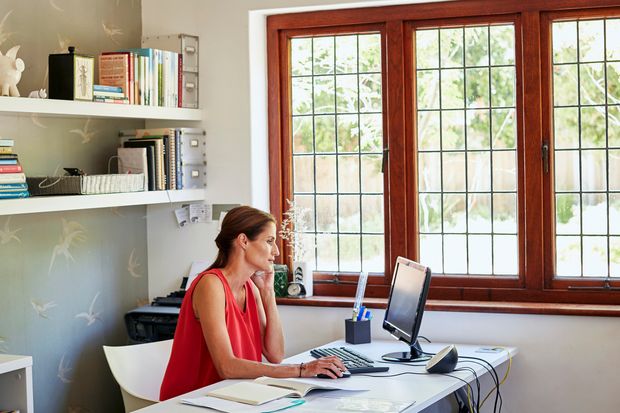
It might be time to change your workspace
Getty Images
The great work from home experiment has dragged on for six months and running, and it’s taking a toll. According to a survey of more than 1,500 respondents, conducted by the remote job board FlexJobs with the nonprofit Mental Health America (MHA), remote workers are burned out.
In fact, 40% of the workers surveyed said that longer hours since the pandemic is one reason they’ve experienced burnout.
Other findings: Employed workers are more than 3 times as likely to report poor mental health now versus before the pandemic. A sizeable 18% of employed workers say they are struggling with mental health issues, up from 5%, and 42% say their stress levels are currently high or very high.
More than three-quarters (76%) of respondents agree that workplace stress affects their mental health, leading to depression or anxiety, and 17% strongly agree.
It’s not just working longer hours. Other triggers I’ve found from interviews with dozens people working from home have been the daily demands of juggling work and family, caregiving for kids and aging relatives, while simultaneously ramping up new tech skills for communicating with bosses and team members and managing projects.
Meantime, without adequate social interaction for those who are not surrounded by family. loneliness can create depression and a range of other emotional and physical health complications.
While some workers are returning to the office, many are not, especially workers over 50, who might be vulnerable to the health risks associated with Covid-19, or are working remotely in part-time remote retirement jobs.
If that’s your experience, I’ve got some advice for you.
Here are tips to help you successfully navigate your work from home reality with your mental health intact from my new book: Great Pajama Jobs: Your Complete Guide to Working From Home.
It’s hard to speculate on what the new rules of social interactions will be moving forward. In some fashion, use the advice below to help you formulate the best way for you.
Set workplace boundaries
This is essential to making remote work a success for you and your employer. “The secret to setting boundaries is to intentionally and purposefully incorporate meetings, breaks, vacations, calls, coffee with friends, and activities into your calendar,” says Dan Schawbel, managing partner of Workplace Intelligence. “By doing this, it will force good behavior and alleviate your burnout. Remember that burnout is counterproductive. You may think you are getting more done, but it’s at the cost of your health and happiness, which will eventually wear you down,” he says.
Nurture the human touch
One thing we lose when we work from home is the energy, engagement and positive vibes we get from laughing at a co-worker’s joke, making eye contact with someone and smiling, or kibitzing as we wait for the coffee to brew.
Now that lockdown restrictions have eased, plan time to meet friends, or other remote workers you know who live nearby. This can be a coffee, lunch, or even an afterwork drink.
I personally have a really hard time with this. Taking time to meet someone in person is a time suck, especially when you have deadlines looming, and who doesn’t? Without question, the day of the date, I complain and am annoyed that I agreed to the get-together. What was I thinking? I have this and this and this to do. It breaks my work rhythm.
And I have to get dressed in something other than my leggings or jeans and put on some makeup, and that can take time, too. Afterward, however—and I’m not making this up—I’m genuinely buzzing with energy. I’m recharged.
It’s a boost psychologically. Set a specific time period for the break. (And, of course, don’t let your guard down — wear your mask and practice appropriate social distancing).
That said, I’ve never before talked to so many workers who quickly adapted during the coronavirus work from home orders to using communication technology like Zoom conferencing and are embracing it with stress-busting virtual meetups with colleagues, co-workers, friends and family.
At the very least, periodically pick up the phone and connect voice-to-voice. This can zap some precious time. I know this because, since I have worked solitary for years, I find that I start jabbering away once I start a phone conversation. I barely realize my thirst for someone to talk to until the conversation gets rolling.
The good news: I hang up motivated. That time genuinely builds fellowship and friendship and keeps you in the loop with office and industry happenings in a way a typed note or text simply can’t.
Another option if you are “owned by a dog,” as I am, you might schedule a dog walking date a few times a week with someone nearby who also has this activity on their daily regime.
As you walk along, look up at the sky. Soak in some fresh air. Check out the gardens and window flower boxes of the houses on your street, or wildflowers along the road, if you live in the country. Other positive possibilities: Bake chocolate chip cookies. (Ok, that’s my favorite escape.) Do some mindful meditation, yoga, or breathing exercises. Pick up a magazine article to read that you’ve set aside, or a book—something not on your computer screen, to rest your eyes.
Call someone you love, say, your mom, or your sister. Laugh out loud. Sip a cup of tea on your porch. Whatever it is that helps you pause and recharge, do it. I like to take a break every few hours and stretch, but you will figure out what works for you. These breaks are essential to your wellness.
Set up your ‘office’ in a new spot
Changing your “work-space” scenery can give you a boost. You might opt to work on the outdoor patio (physically distanced) of a coffee shop, or an independent bookstore with a café, or your front porch. I’ve been known to set up my laptop in the barn tack room where I stable my horse. There’s a strong Wi-Fi connection, and that soothing aroma of leather and horses. At home, my husband works remotely as a documentary editor and producer downstairs. I have the upstairs space at our home. Periodically, we shift floors for some new vistas.
Don’t forget to eat with an eye to nutrition
It’s super easy to forget to stop to eat properly and simply snack all day on chips and sweets. It’s important not to skip meals to keep your brain and body energy humming. Stay hydrated with plenty of water and keep fruit or veggies nearby to nosh on.
Declutter your office
When people feel low on energy, often it’s because they’re not clearing out as they go. Their e-mail inbox is overflowing. Their desk is a disaster.
Decluttering is liberating and empowering. It’s something you can control. You’re saying, “This is valuable; this is not.” It’s a physical, practical way to engage in making decisions about your life and what you want to do with it. Getting rid of stuff brings a new perspective.
Find a positive image to inspire you
When I’m feeling edgy and stressed,I simply close my eyes and visualize a rolling green field in the Virginia countryside with a sweeping view of the Blue Ridge Mountains. I imagine myself aboard my horse cantering in cadence with the wind on my face through the grass. It calms me down. I feel peaceful, and my attitude shifts.
You might also tape an inspiring image on your office wall–away from your computer and phone. That way, you’ll have to turn to look directly at it, which can be transporting. The very action of shifting your attention away from your computer is a respite. It’s reviving and centering at the same time.
Since March, for millions of work-from-homers, time has collapsed and work-life boundaries have blurred. None of us know where it is headed, as I discuss in this recent podcast with host Susan Flory of The Big Middle.
We’re all trying to make sense of our working lives through the murky lens of COVID. Don’t let your mental health be a victim. Practice these simple habits and reach out for professional help if it all feels overwhelming. You’re not alone trying to make it, well, work.
Kerry Hannon is a leading expert and strategist on work and jobs, entrepreneurship, personal finance and retirement. Kerry is the author of more than a dozen books, including Great Pajama Jobs: Your Complete Guide to Working From Home, Never Too Old To Get Rich: The Entrepreneurs Guide To Starting a Business Mid-Life, Great Jobs for Everyone 50+, and Money Confidence. Follow her on Twitter @kerryhannon.








